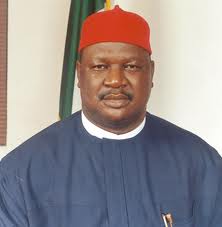
INDUSTRIAL unions, civil society and the academia have urged government to involve the people more in the process of governance. The groups stated this in Abuja while they were making their inputs into the draft report of the second peer review of Nigeria.
A statement signed by the Chairman of the National Steering Committee, 2nd Peer Review of Nigeria, Senator Ken Nnamani, at the end of the meeting, noted that Nigeria has made significant progress in all aspects of governance in spite of the challenges and some emerging issues.
Speaking at the occasion, the Secretary to the Government of the Federation, Senator Anyim Pius Anyim represented by Ferdinand Agu, commended the National Steering Committee for its sense of dedication to duty and the Nigerian government for being the first to submit itself to the process of the second review.
The African Peer Review Mechanism (APRM) was inaugurated on March 9, 2003 by African leaders within the context of their initiative – the New Partnership for Africa’s Development (NEPAD) as an instrument for self-monitoring for good governance in all its ramifications.
The APRM has, at its fulcrum, the deepening of democratic and development practices and covers four themes: democracy and good political governance, economic governance and management, corporate governance and socio-economic development.
Commenting on the spate of violence in the country, the report highlighted the increase of various types of conflicts confronting Nigeria, which include, the indigeneship/settler and other forms of communal conflicts, rural banditry and cattle rustling and the Boko Haram insurgency, which have added to the Niger Delta conflicts highlighted in the 2008 First Review.
It noted that there was urgent need for Nigeria to develop new and more effective approaches to managing conflicts. The APRM Country Review Report of Nigeria described the country as having a paradox of extreme riches as well as mass poverty.
It said: “Inspite of the abundance of rich natural resources, the country’s over-reliance on its rich oil resource base has had an adverse effect on its economy, resulting in the neglect of other sectors, high levels of corruption and rent seeking, poverty, high unemployment rates, poor infrastructure, low growth rates, and widespread insecurity and crime.
President Jonathan’s transformation agenda which is a 5-year development plan 2011-2015, focused on three key areas (a) strong, inclusive and non-inflationary growth; (b) employment generation and poverty alleviation; and (c) value re-orientation of the citizenry.
While the plan looked good on paper, it has not succeeded in producing significant improvement. Indeed, corruption has worsened over the past five years.”
 The validation meeting emphasized that it is imperative that Nigeria consolidates its efforts towards diversification of the economy to reduce the impact of external shocks, encourage private sector-led development, improve infrastructure to create a conducive environment for business development, reduce youth unemployment, right-size and transform the civil-service and combat corruption more decisively and aggressively.
The validation meeting emphasized that it is imperative that Nigeria consolidates its efforts towards diversification of the economy to reduce the impact of external shocks, encourage private sector-led development, improve infrastructure to create a conducive environment for business development, reduce youth unemployment, right-size and transform the civil-service and combat corruption more decisively and aggressively.
It therefore expressed hope that the incoming Buhari administration would productively take up the development challenges. One positive element of the report is the recognition that Nigeria is now Africa’s largest economy.
The rebasing of its Gross Domestic Product (GDP) in April 2014 to better reflect the structure of the economy saw it surge ahead of South Africa to become Africa’s largest economy with a reviewed GDP estimate of $454 billion in 2012 and $510 billion in 2013 (compared with $259 billion and $270 billion that were reported previously).
The report also noted that a rebased economy that saw Nigeria hitting $454 billion Gross Domestic Product (GDP) in 2012 and $510billion in 2013 assures of better days ahead.
It stressed that the rebasing exercise also indicated that the Nigerian economy is transforming from an agrarian economy to a tertiary service economy, without going through the intermediate stage of industrialization, saying, “this atypical transition poses challenges for the sustainability and inclusiveness of economic growth.”
The validation meeting frowned at the collapse of the public educational system in a context in which the majority cannot afford access to expensive private education, which is of higher quality.
The meeting called for the development of effective mechanisms to ensure that all stakeholders participate more in developing, implementing and monitoring education policies and programmes; mobilizing religious and traditional leaders, among others, for sustained sensitization campaign to promote the access of women and girls education; developing an effective nationwide advocacy campaign to support and increase the number of ‘special schools’ for married girls and young mothers, and include a quality curriculum and crèches for these schools.
As Nigeria engages in the transition from a ruling party to the opposition party taking over power, the meeting called for more participatory and inclusive governance process.
It stressed that there is the need for the adoption of a three-stage model of citizen engagement that include the information provision stage, which is a one-way relation in which government produces and delivers information for use by citizens; the consultation stage, which is a two-way relation in which citizens provide feedback on issues defined by government; and the active participation stage, which is a partnership relation in which citizens actively propose policy options and shape the policy dialogue, but where government retains the responsibility for policy formulation and final decisions.



